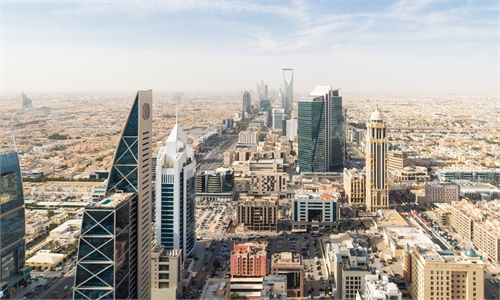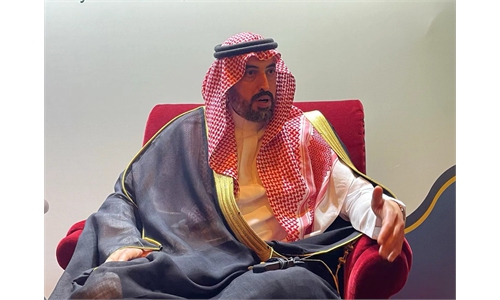
A view of Riyadh, capital of Saudi Arabia Photo: VCG
A new exchange-traded fund (ETF) tracking Hong Kong-listed stocks, the SAB Invest Hang Seng Hong Kong ETF, has debuted on the Saudi Exchange on Thursday, following the launch of Saudi Arabia’s first ETF tracking the Hong Kong equity market on the Saudi bourse on Wednesday.
Observers said the listings marked a milestone in strengthening the financial connections between the Chinese and Middle East markets.
The ETF listing comes as cooperation between China and the Middle East has entered a “fast lane.” While offering Middle East investors with convenient channel to invest in high-growth sectors in the Chinese mainland and Hong Kong capital markets, the launch will also bring in more international investors and funding to the Hong Kong market and further boost the allure of the Hong Kong Special Administrative Region (SAR) as a global financial center, analysts said.
The Albilad CSOP MSCI Hong Kong China Equity ETF, the first of its kind in Saudi Arabia issued by Albilad Bank of Saudi Arabia and Hong Kong’s CSOP Asset Management, has an initial size of over $1.2 billion. It became the largest ETF in the Middle East upon its listing on Wednesday.
The index fund allows Saudi investors to directly trade Hong Kong stocks across such sectors as consumer goods, healthcare and technology, the Xinhua News Agency reported. The trading volume of the ETF has reached 1.15 million Saudi riyals ($310,500) within the first hour of the trading, making it the highest-traded ETF on the Saudi stock exchange so far, said a report by thepaper.cn.
Deepening partnership
Hong Kong Financial Secretary Paul Chan said at the ETF’s listing ceremony in Riyadh on Wednesday that the ETF “is a reciprocal arrangement, completing the conduit for a two-way capital flow between Hong Kong and Saudi Arabia.”
Chan stressed that financial and investment cooperation plays a vital role in boosting ties between China and the Middle East, and it also fits well into the vision of the China-proposed Belt and Road Initiative (BRI) and Saudi Arabia’s Vision 2030. “I’m confident that the ETF will inspire deeper, more connected, and win-win financial relations between HKSAR and Saudi Arabia,” he noted.
Regarding the SAB Invest Hang Seng Hong Kong ETF which was launched on Thursday by SAB Invest in collaboration with Hang Seng Investment, Ali AlMansour, managing director and chief executive officer of SAB Invest, said that the launch symbolizes the deepening partnership between Saudi Arabia and China.
“The listing of this ETF will bring numerous benefits by enhancing the investment climate in Saudi Arabia, widening available markets and instruments for local investors for the development of the capital market, and attracting and localizing foreign investments,” AlMansour was quoted as saying by the Hang Seng Investment.
Lian Ping, president of the China Chief Economist Forum, told the Global Times on Thursday that the ETF listings highlight the growing interests of Saudi Arabia as well as the whole Middle East region in investing in Chinese equities. He noted that similar products were scarce in the past, often requiring Middle Eastern investors to seek indirect investment channels.
“Investors’ interest is underpinned by the prospect of China’s economy, which has been on a steady growth path. Also, the stable and friendly relations between China and Saudi Arabia further set the stage for in-depth bilateral market connection,” Lian explained.
Growing enthusiasm
In November 2023, Asia’s first and the world’s largest Saudi Arabia-focused ETF went public on the Hong Kong stock exchange. On July 16, two Saudi ETFs made a strong market debut in both the Shanghai and Shenzhen stock exchanges.
It is reported that a number of funds from the Middle East, such as the Abu Dhabi Investment Authority and Kuwait Investment Authority, have invested in multiple Chinese companies such as Zijin Mining, Bank of China and BYD.
The trend of stepped-up capital market connection between China and the Middle East is in line with Middle East’s economic development goal to diversify its investment portfolio and reduce reliance on incomes from traditional energy resources, analysts said.
Analysts predicted that with the ongoing opening-up efforts in the financial market, more investment products and services on Chinese market are expected to be listed in the Middle East market, which will foster steady two-way capital flow and lead financial cooperation between the two economies to become deeper and broader.
For example, more ETFs tracki g China’s high-tech sectors could debut in the Middle East market in the future, enabling investors there to share the dividends of China’s high-quality economic development, Lian said.
Liang Haiming, chairman of Hong Kong-based China Silk Road iValley Research Institute, told the Global Times that there is great room for cooperation on a wide range of financial sectors, such as digital payments and blockchain technology, as well as jointly launching green fintech products.
The two ETF listings came as Hong Kong Financial Secretary Chan led a delegation from the financial, innovation and technology sectors for a three-day visit to Saudi Arabia, which kicked off on Monday.
During the visit, Chan elaborated on Hong Kong’s significant role in the global capital market. Aided by its unique advantage of “one country, two systems,” Hong Kong has become the premier international financial hub connecting the Middle East with the Chinese market, particularly in three key areas: fund raising, asset and wealth management, and green and sustainable finance, he said.
The Hong Kong Exchanges and Clearing Limited (HKEX) announced on Wednesday that it plans to open an office in Riyadh in 2025 to strengthen HKEX’s Middle East presence as it looks to promote greater connectivity between China and the Gulf region, according to a statement seen on the stock exchange’s website.
“We expect the HKSAR to further leverage its role as a ‘super-connector’ to facilitate more global investments in Chinese assets,” Liang said on Thursday.
This is also conducive for the region to enhance its international influence and consolidate its position as a global financial and trading center, Liang noted.




